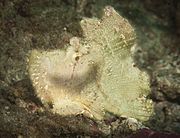Taenianotus triacanthus facts for kids
Quick facts for kids Taenianotus triacanthus |
|
|---|---|
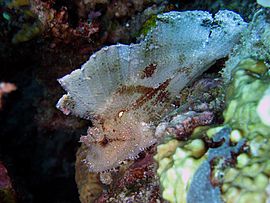 |
|
| Conservation status | |
| Scientific classification | |
| Kingdom: | |
| Phylum: | |
| Class: | |
| Order: | |
| Family: | |
| Subfamily: |
Scorpaeninae
|
| Genus: |
Taenianotus
Lacepède, 1802
|
| Species: |
T. triacanthus
|
| Binomial name | |
| Taenianotus triacanthus Lacepède, 1802
|
|
The leaf scorpionfish (Taenianotus triacanthus) or paperfish is a species of marine fish, the sole member of its genus.
Description
The leaf scorpionfish is about 10 cm (4 in) long fully grown. Their color varies from green, red, pink, brown, ocher and yellowish to a ghostly white. The fish is almost as flat as a leaf and resembles a leaf in many other ways. The head and mouth are large. Through their eyes is a dark line. The large dorsal fin starts just behind the eyes and has 12 spines and eight to 11 soft rays. The anal fin has three spines and five or six soft rays. The venom of the leaf scorpionfish is considerably weaker than that of the lionfish and stonefish. The skin often has blotches that enhance a camouflage effect. This fish has appendages around the mouth, and sometimes real algae and hydroids grow on its skin.
This fish molts every 10 to 14 days, and can change colors after the molt.
Behavior
The leaf scorpionfish resembles a dead leaf lying in the water. To enhance this camouflage, it even makes gentle sideways movements in its pelvic area which make it resemble a drifting inert object. It is an ambush predator, waiting until suitable prey, a small fish or shrimp, approaches. Then it slowly moves with its pectoral fins close to the victim. When the leaf scorpionfish is close enough, the prey is sucked in by a sudden opening of its mouth. It eats small crustaceans, fishes, and larvae.
Distribution and habitat
Taenianotus triacanthus is widespread from east African coast and the Red Sea to the tropical Indo-Pacific, north to the Galapagos Islands, the Ryukyu Islands, Hawaii, and the coast of New South Wales. This species can be found in tropical waters on coral reefs, from shallow water to a depth of 130 m.
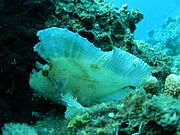
T. triacanthus in Vietnam
|
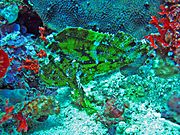
T. triacanthus in Bunaken, Sulawesi
|
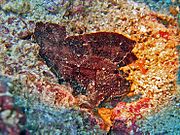
Leaf scorpionfish in Borneo
|



